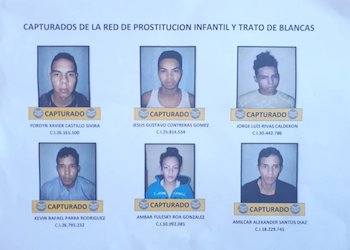Authorities in Spain and Venezuela have arrested members of two different transnational networks sexually exploiting women and girls fleeing the South American country’s political and economic crises.
The sex trafficking rings dismantled by authorities in the respective countries this week both capitalized on the desperation of women and girls seeking job opportunities abroad by tricking the victims into situations of forced prostitution.
Spanish law enforcement announced on June 27 that nine alleged members of a sex trafficking network based in the country’s northwestern province of Salamanca had been arrested for their involvement in a group that trafficked Venezuelan women and forced them into prostitution under “semi-slavery” conditions. The alleged leader of this group was arrested in Venezuela on May 30 based on an effort coordinated through Interpol.
According to Spanish authorities, who launched their investigation of the group in late 2017, the criminal network relied on its leader and members in Venezuela to deceive women into believing “transporters” would bring them to Spain for legitimate work opportunities. Once there, the women would be told they owed a debt that could only be paid off by prostituting themselves in nightclubs managed by the group. If they refused, the victims were threatened that the group’s members in Venezuela would kill their relatives.
The network used a string of heavily guarded nightclubs to generate profits from the forced prostitution, which where then laundered through at least eight companies the group owned.
Thirteen victims were rescued and more than 2 million euros (almost $2.4 million) worth of properties, cash, jewelry and vehicles, as well as weapons, were seized as part of the operation.
SEE ALSO: Coverage of Human Trafficking
Meanwhile on June 23, police in the Venezuelan state of Táchira arrested six alleged members of a separate sex trafficking network believed to have lured adolescent girls with promises of employment in neighboring Colombia, only to funnel them into forced prostitution in Venezuela, Colombia and Brazil.
According to Táchira Governor Laidy Gómez, victims of the sex trafficking network identified police and school officials as having facilitated the recruitment of girls aged 12 to 15, some of whom were smuggled across the Venezuela-Colombia border.
The investigation was prompted by reports from parents in Táchira that their daughters had gone missing. However, authorities are expanding the scope of the investigation based on the fact that other victims have been trafficked by the network from elsewhere in Venezuela into the border state. Governor Gómez has requested assistance from authorities in the neighboring Colombian state of Norte de Santander to continue the investigation.
InSight Crime Analysis
The recent dismantling of two transnational sex trafficking rings preying on Venezuelan victims are a stark reminder of how the South American country’s insecurity and spiraling crisis are creating lucrative opportunities for criminal groups to exploit desperate migrants.
SEE ALSO: Venezuela News and Profiles
The criminal networks brought down in Spain and Venezuela are hardly the first to rely on a bait-and-switch model to recruit women from disadvantaged areas with false promises of work abroad, only to entrap them in situations of sexual servitude. Similar sex trafficking rings have been dismantled in recent years across Latin America, the Caribbean and Europe. For example, last month, authorities in the Dominican Republic rescued two dozen Venezuelan women who had been forced into prostitution there.

